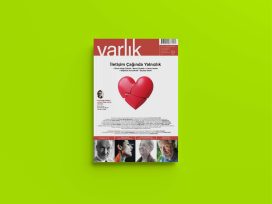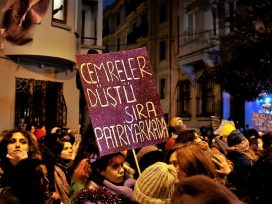Adding colour to a black-and-white conflict
An interview with Basak Senova of NOMAD
Süreyyya Evren: Basak, you protested Israel’s attack on Lebanon by designing a webpage and collecting reactions of Turkish artists and designers there. You named the project “low_res_reaksiyon” (nomad-tv.net/low_res_reaksiyon) and it was a project by the art group NOMAD. Can you tell us more about the motives of “low_res_reaksiyon” and NOMAD?
Basak Senova: NOMAD is an Istanbul-based association that aims to produce and experiment with new patterns in the digital art sphere by using the lenses of various other disciplines. NOMAD’s production network aims to build strong connections across territorial borders through digital culture-oriented projects – initially in Europe and the Middle East, then in other areas. The main goal of these projects is to establish a productive communication channel that enables access to new resources of information. Since 2002, NOMAD has developed numerous local and international projects, including festivals, exhibitions, performances, multimedia events, experimental film screenings, lectures, panels, and publications.
NOMAD has been producing and working on mutual projects with artists and curators from Middle Eastern countries such as Lebanon, Egypt, Israel, and Palestine since 2003. For that reason, we have been receiving first-hand information about the invasion in Lebanon since the beginning from various sources and channels in the region. Finally, we resolved on the need for a more concrete reaction than signing petitions and forwarding donation e-mails, and therefore designed this site. The website “low_res_reaksiyon” aims at bringing together the intellectual reactions of artists and designers in Turkey in the face of the events that have taken place in the Middle East since July 2006. This was a NOMAD initiative; we called upon artists and designers on the internet and through other communication technologies after completing the site. The site is open to all artists and designers participating from Turkey, and continues to grow due to the communicative nature of the internet.
The site is called “low_res_reaksiyon”, and its format criticizes mass inertia, as well as our helplessness. Our experiences and the situation in which we are all silent witnesses emphasize and demonstrate the abyss between societies and their governments. We watch immobilized, submissively wait for things to happen to us. “low_res_reaksiyon” is also a self-criticism. The fact is that these low resolution reactions compressed into 250 x 250 pixels are destined to be puny and ineffective.
SE: Reactions of artists to large-scale political events, such as Israel’s latest attack on Lebanon, have always been an interesting subject for many. Personally you have been involved in some art projects in the region as well. Can you tell us more about your own approach to the events and the art scene there?
BS: Actually, artists’ reactions resemble one another no matter where they come from. At least our contacts believed that the war should end immediately, and chose to react through their works. Through our contacts, the Palestinians were more guarded and quiet at the time; we received calls for boycotts and e-mails from artists and curators. Those in Lebanon showed their reactions more often through e-mails and blogs. Most Israeli artists joined the anti-war petitions, and I think most effective was the campaign initiated by maarav.org, an online left-winged, anti-war publication. Over 150 Israeli artists produced works and gave their signatures. This is a significant reaction for a population of 6 million. However, it is important to keep in mind that this information comes from our group of contacts. Since we do not know whether or not there were pro-war artists and events, it would be a mistake to make an assumption.
The Middle East harbors complex relationships, histories, and contradictions. The composite pre-war events and those of the present are far from being a simple equation. Most people in the world see this as a black and white conflict as a result of the information they receive, filtered by the media. We see the same projection from the international art community. My view of most art projects focused on the region is that they normalize the repression based on violence. I strongly believe that in the long run projects that will have public effect will be those that come from the Middle East and aim for the Middle East, free of global art-marketing ambitions.
NOMAD is presently working on a project that also touches on this process – “Conscious in Coma” (nomad-tv.net/conscious_in_coma). The project’s first chapter will open at the Istanbul Goethe Institute with video screenings selected by nine curators from the Middle East and Europe (Elena Veljanovska from Macedonia, Stefan Rusu from Moldova, Nat Muller from the Netherlands, Vera-Maria Glahn from Germany, Clare Davies from Egypt, Jack Persekian from Palestine, Christine Tohme from Lebanon, Amirali Ghasemi from Iran, my selection from Turkey). Curators participating from the Middle East will be presenting selections of the local effort I have mentioned.
SE: Beside artists, we also have to discuss art institutions and their approach to the subject matter. Some suggest we should be more suspicious about Israeli-based art institutions. What would you say?
BS: We decided not to accept any support from institutions related to the Israeli government. Anti-war artists and institutions in Israel did likewise. I think that this is a justifiable reaction. But we have to note that this was NOMAD’s internal decision, free of any outside influence or pressure. This is why we refused to sign any externally produced appeals for boycotting. NOMAD applies its own principles regardless of state politics not only in this region, but in all regions. Nor has NOMAD ever signed a project it did not believe in.
We believe in the equal distribution and sharing of information and production. This is also the basis of digital culture. So far, we have worked with those in tune with our own mental and productive frequency, free of mundane political interests – regardless of geography, religion, language, race, and sex. We intend to continue with the same determination.
Published 30 May 2007
Original in Turkish
First published by Varlik 9/2006
Contributed by Varlik © Süreyyya Evren, Basak Senova/Varlik Eurozine
PDF/PRINTNewsletter
Subscribe to know what’s worth thinking about.



